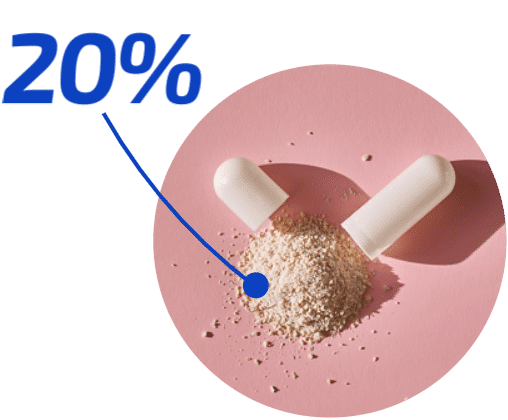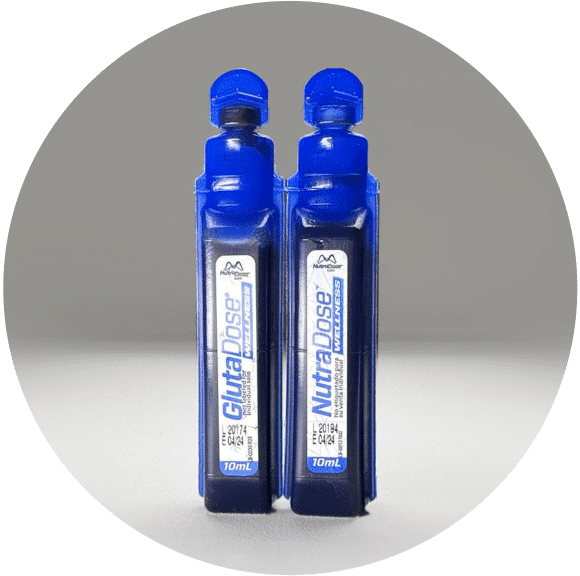“El cuerpo absorbe alrededor del 98 por ciento del contenido de un producto líquido, mientras que el organismo suele absorber sólo un 20 por ciento de las vitaminas de un suplemento en pastillas”
One might assume that taking supplements can only be a positive thing, as it saves time and boosts vitamin levels. But it turns out that the matter is a bit more complicated, because the way you take the supplements can have a significant impact on their effectiveness.
This is great news because if you want to optimize your health by taking vitamins in addition to your normal diet, then you should also optimize the nutritional value you get from them. Shockingly, very few supplements provide information on their bioavailability, which details exactly how much of a supplement is actually absorbed by the body. That’s because not all vitamin brands can compete in this regard, especially pill and gummy supplements, which break down slowly in the body.
According to independent testers like Consumer Lab, common multivitamins in pill form don’t even completely dissolve in the body an hour after ingestion; liquid vitamins, on the other hand, bypass the digestive process entirely and can be in the bloodstream within minutes.
So what are the consequences of this? Solid supplements cannot properly release absorbs about 98 percent of the contents of a liquid product, while the body typically absorbs only about 20 percent of the vitamins from a pill supplement.

Think about this for a moment. Can you imagine buying a beauty product and only using 20 percent of it? Or a gym membership that only gives you 20 percent of the month?
With any other purchase, you’d be hard-pressed to imagine that such waste is really
worth the cost.
And while this type of malabsorption is a problem for any consumer, it’s especially problematic for health-conscious shoppers who lose a much-needed boost to their active lifestyles.
The decision of whether to deliver a vitamin to the body in pill form or liquid form often
depends on biochemical and physical factors.
All pill forms of vitamins, including cellulose capsules, have a solid form that has a chemical structure. So they have dimensions – size, shape and strength – plus the physical properties of how they’re broken down in the body. Liquid forms of vitamins don’t have these obstacles.
Reasons to choose a
liquid dosage form over
solids or tablets

Generally, the absorption process begins in the mouth, under the tongue, and the rest is absorbed in the stomach at a different rate than its liquid counterpart. Taking pills may not be ideal in various circumstances related to the ability to swallow effectively. The effectiveness of the vitamin doesn’t usually depend on the form in which it’s absorbed in the stomach, but the rate of absorption is greatly affected by the form. The rate at which a vitamin is absorbed depends on the physical chemistry of the compound.
By and large, a liquid is absorbed much faster in the mouth or stomach than a solid tablet form. The body may even begin absorbing liquid vitamins before they reach the stomach. This speed – and the reasons for slower or faster absorption of the vitamin – are an important factor in whether your functional medicine doctor recommends a liquid or a tablet. If faster absorption is needed, a liquid form is preferred. With a liquid, the gastrointestinal tract doesn’t have to work as hard to break down and process the vitamin.

The dosage of vitamins and whether a liquid or tablet form will produce the desired result often depends on the amount of supplementation required to achieve optimal vitamin levels.
If the desired effect is a therapeutic one, because a patient is struggling with a specific disease, and not just focused on wellness, the dosage may be increased. In this case, bioavailability may need to be increased, and the liquid form may be preferred for two reasons. First, the number of capsules required to achieve the therapeutic dosage may not be cost effective. And second, it is inconvenient for a patient to take four capsules three times a day. With one liquid, the required dosage can be achieved more quickly and efficiently.

Liquids simply break down as they go through the breakdown process in the body, making their bioavailability higher because they’re largely freed from the need for active physical breakdown. This makes liquid vitamins more available for absorption. The shelf life of liquid vitamins may be shorter than that of tablets, as they usually lack the stabilizers that allow tablets to last longer. Hard tablets necessarily contain fillers, binders and stabilizers to give them this form. They’re shelf stable, but these additives come at the expense of bioavailability. Cellulose capsules break down more quickly than hard tablets, but still take longer than liquids – up to an hour or more – because of the physical barrier. With vitamin tablets, there is also the question of what the added substances are made of. Are they of plant origin or synthetic? Is something added that the body doesn’t need and perhaps shouldn’t have?
Aside from preferring a faster absorption rate and higher dosage, liquid vitamins are generally the preferred form when:
Usually the liquid is administered with a dropper, but a small cup or shot glass can also be used. More and more doctors and alternative practitioners are recommending BFS as the most advanced, safe and accurate way to take vitamins.

Delivered in 3-5
days for free

If you're not satisfied, request a full refund within 30 days.

Email us at [email protected],
we're here for you
*Estas declaraciones no han sido evaluadas por la Administración de Alimentos y Medicamentos (FDA).
Este producto no está destinado a diagnosticar, tratar, curar o prevenir ninguna enfermedad.
ADVERTENCIAS Y PRECAUCIONES:
No se recomienda su uso en mujeres embarazadas o lactantes. Consulte a su médico antes de utilizar este producto si padece o ha padecido algún trastorno médico, como un trastorno autoinmune; incluyendo esclerosis múltiple, lupus o artritis reumatoide; un trasplante de órganos; una infección aguda; o si
está tomando algún medicamento con receta, incluidos los agentes inmunosupresores. Si se produce alguna reacción adversa, suspenda su uso y consulte a su médico.
Recomendado: suspenda el uso del producto una semana antes de cualquier procedimiento quirúrgico.
Mantenga este producto fuera del alcance de los niños. La información contenida en Glutadose.com se proporciona únicamente para su información general. Nutradose Labs LLC no brinda asesoramiento médico ni participa en la práctica de la medicina. Si no está seguro de su estado, consulte a un médico.
Los resultados individuales pueden variar.